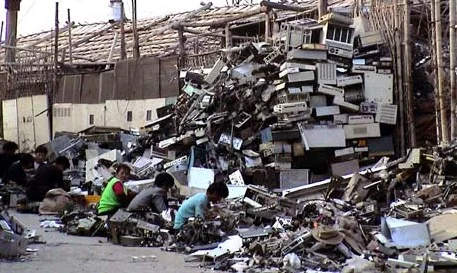A synthetic soup of heavy metals and chemicals
By Laura Haight
Published as The Digital Maven by Upstate Business Journal on April 15, 2016
Every business has one. The junk closet or storage area where old computers, once lusted-after-now-thrown-over laptops, boxes of outdated phones, broken keyboards with missing e's or shattered space bars and, of course, box after box of tangled cables and cords.
If your company doesn't have one of these areas, chances are you do one of two things regularly: throw your old equipment out in the trash or participate in a certified e-waste recycling program. I hope it's the latter, but fear it is not.
If you are throwing your electronics away in regular garbage you are violating a number of state and federal laws, contributing to global warming, polluting the environment significantly and contributing the illness and death of thousands throughout the world who live and work in landfills, pulling apart electronics and selling the recyclable parts.
The United Nations estimated that 41.8 million tons of e-waste, a broad term that encompasses anything with an electrical cord or a battery, was dumped globally in 2014. Of that only 6.5 million tons was recycled and properly disposed of. The US contributed the most to this global problem, dumping 7.1 million tons and recycling less than a million tons.
If you have been part of this global problem, you can turn over a new leaf next weekend when Greenville holds one of its two annual E-Waste Recycling Days.
Electronics ranging from computers to refrigerators contain a wealth of recyclable components and metals that can be reused in manufacturing. In March, Apple unveiled Liam, a robotic device that deconstructs iPhones, separates elements and extracts parts that can be repurposed. It's pretty cool but technology companies providing recycling methods is not new. Dell has had a robust recycling program since 2004, recycling over 176 million pounds of waste. The Dell Reconnect program accepts any computer from any manufacturer, as well as just about any peripheral that attaches to a computer. The company partners with Goodwill and you can find a location near you here.
What's in a computer?
Why is this important? Is it just overfilled landfills and not enough area for new ones? No, it's not the amount of e-waste but the quality of the e-waste that makes electronic recycling important.
In China, now known as the world's largest e-waste landfill, families live and work on piles of discarded electronics, with everyone from toddlers to grandparents pulling apart cables, wires, chips and motherboards in search of the small bits of gold, copper and silver that they will resell. Sounds enterprising, right? After all, that's what Dell and Apple, among others, are doing. But they aren't sitting in it, breathing it, they don't wash their clothes in it, or cook their food in it. Apple and Dell are deconstructing these devices in clean rooms, with robots doing the work as much as possible, because they know the dangers of the chemical waste.
Electronics are a synthetic soup of lead, beryllium and cadmium. Primitive recycling techniques, like burning cables to recover the copper within, "expose adult and child workers to a range of hazardous substances," notes the World Health Organization.
"E-waste-connected health risks may result from direct contact with harmful materials such as lead, cadmium, chromium, brominated flame retardants or polychlorinated biphenyls (PCBs), from inhalation of toxic fumes, as well as from accumulation of chemicals in soil, water and food. In addition to its hazardous components, being processed, e-waste can give rise to a number of toxic by-products likely to affect human health," the organization reports.
And China is not the only country facing a critical health issue due to e-waste dumping and recycling. Most of the e-waste from the US and other developed nations ends up in the dumps of developing countries where families subsist on a few dollars a week in income. In addition to China, India, Pakistan, Vietnam, and the Philippines handle from 50 percent to 80 percent of the e-waste dumped in the world.
What can you do?
It doesn't take much on each of our part to become a better citizen of the world. If you're a consumer, take your old devices to next Saturday's recycling event right here in Greenville. But if you miss it, you can go any day to a participating Goodwill, where they will be properly recycled and repurposed by Dell. That may have the added advantage of making your next device cheaper.
If you're a business, be a responsible one. All guys with trucks are not the same. Look for an R2 certified company or a company with the e-Steward designation to be sure they will safely deconstruct and dispose of the components of your electronics and keep chemicals and heavy metals out of the waste stream.



